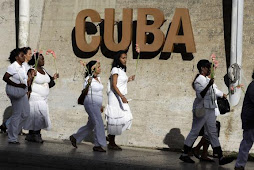By Anett Rios
SANTIAGO, Cuba – The Catholic Church of Cuba is setting reconciliation
among Cubans as its priority in the year of Pope Benedict XVI's visit to
the Communist-ruled island.
In an interview with Efe, the president of Cuba's Catholic bishops
conference, Dionisio Garcia, said that Cubans need a "far-reaching"
reconciliation, though he admits there are still "people who reject it"
both on the island and elsewhere.
Garcia, the archbishop of the eastern city of Santiago de Cuba, believes
that division is detrimental both to families and to Cubans' social,
cultural and political life, and for that reason recommends promoting an
attitude of "accepting the other, accepting what they think, what they
say, what they are, and how they view the reality of things."
Cuban Catholic authorities will emphasize a strengthening of this
conciliatory attitude during their pastoral labors of 2012, the Jubilee
Year celebrating the 400th anniversary of the finding of the statue of
Our Lady of Charity, patroness of Cuba.
Garcia recalls that this celebration and the pope's visit are taking
place after the country's transition "from a rigid Marxist state to a
state in which religious freedom...is accepted."
The visit of Pope John Paul II to Cuba in 1998 signified a "point of
change" after years of work in which the church sought a greater
presence on an island where relations between prelates and the
revolutionary government were generally fraught with tension.
In that sense, the archbishop said that John Paul II's visit and the
upcoming trip of Benedict XVI represent entirely "different situations."
"There were international changes that moved Cuba. There were also
changes in the way the government saw the role of faith and the clergy,
there was the fall of the socialist bloc with Cuba turning more and more
toward Latin America," Garcia said.
The March 26-28 trip of Benedict XVI comes during the celebrations of
the Jubilee Year, and the pontiff will arrive as a "pilgrim" on a visit
to the National Sanctuary of Our Lady of Charity of El Cobre in Santiago
de Cuba.
Nonetheless, Garcia acknowledges that it is "inevitable" that "political
effects" are being sought through this visit to Cuba, where President
Raul Castro is promoting economic adjustments and the church and
government opened an unprecedented dialogue in 2010 that ended with the
release of more than 100 political prisoners.
"The Holy Father's visit during this time of changes, which are as yet
very timid but they are changes, encourages us to interpret these
changes from a perspective of respect for each and every other person,
in his dignity as a person," Garcia said.
For the 67-year-old archbishop, the reforms being developed by the
government "could be bolder," though he said that the transformations
being promoted "could really help."
He also said that church and state maintain "fluid" communications.
He added that the church can now "offer its opinions more easily," its
points of view "are listened to" and often receive a reply.
"I believe that it all comes from the continued presence of the church
in Cuba all this time, from the widespread work of the church during all
this time, and also from a changed attitude on the part of the
government," he said.
http://www.laht.com/article.asp?ArticleId=471387&CategoryId=14510





No comments:
Post a Comment